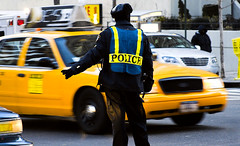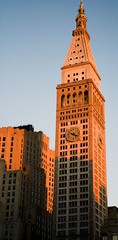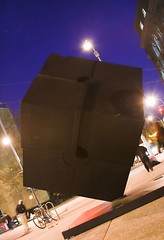The story of my Tuesday Morning commute!
Strike? Not a problem. I’m a good New Yorker. I can make things work.
I live up in the Bronx, around 250th Street and realized that if the HOV-4 mandate was going to go into effect at 5:00 AM, I was just going to have to wake up earlier. Out the door at 4:15, past 96th street by 4:45 at the latest. I’m at work with a hot cup of coffee before the whole problem can begin.
Piece of cake.
I begin my commute and realize immediately that something is wrong. It takes me a couple blocks to realize that I am riding in my car with a flat tire. If I were not a business owner with a responsibility to my business, my workers and the general global economy, I probably should have taken this as an opportunity to stay home.
Instead, I changed my tire. Given the pothole situation in the City, I’ve done this before. Again, this by itself is not a problem. Fifteen minutes definitely beats my brother-in-law in terms of time to fix a flat. This morning, however, time was crucial. I get back on the road and race down to 96th Street, where I see many lights flashing at the blockade point. I look at the clock.
5:01.
I am, of course, alone in my car.
I am deftly swept from the highway by flashing lights and three men in blue. It was poetic. They waved me to the right onto the exit ramp and I was back out, literally the second car swept off the Henry Hudson Parkway of the morning.
At this point, I figure that the only thing to do now is find some passengers. This is, after all, the intention of the blockade in the first place: to force a carpool to make sure transportation works like clockwork. It’s time to trawl the streets looking for some people who needed a ride.
But who is awake at five in the morning? The city that never sleeps, let me tell you, is quite dormant at 5:00 AM. The only people I could find were some homeless people and some intrepid early-risers in pajamas with cameras, tracking the chaos that was beginning to accumulate. None of these people were eager to take a ride — and very quickly, I realized I wasn’t the only car on the streets looking for passengers. This started to get a little serious.
At some point, I realized that finding people to go all the way was becoming a fruitless endeavor — but perhaps that wasn’t necessary either. Perched as I was now between 96th and 97th on Columbus Avenue, I saw the light at the end of the tunnel. To get past the blockade, all I needed were four people in my car.
Even if they were only going for one block.
But how can I convince people to go just one block?
I decided to fall back on that good old American pastime: I would bribe people.
I started with my brother, who was conveniently located on Columbus Avenue and who I had already awakened several times trying to figure out what to do. I went to his building and found one onlooker, still in her pajamas and another woman who was on her way to the gym, unperturbed by the situation since she was already on vacation.
“Look,” I said, “I am willing to offer both of you $20 to ride one block with me.”
A couple eyebrows went up. After all, this really sounds like a proposition for the red light district. “Are you serious?” said gym girl.
“Absolutely,” I said.
“I don’t need the money, ” said the pajama lady, “I’ll just go along for the ride.”
Great, now I have three people. I called my brother again. “Come downstairs.” “What?” “No, really, come downstairs.” “In a few minutes.” “Just put on your coat and shoes and come down here. I have two people waiting, I’ll take you one block and then you can go home to sleep.” Younger brothers can be worn down in this manner. He relented, came downstairs with a grumpy attitude but with his coat on.
Due to the cold, we made a mad dash for the car. I started up and drove back to the blockade. The police shone flashlights in the car, counted us, and allowed us to proceed.
Fifteen feet beyond the police barricades, I pulled over. The gym girl said, “Happy holidays.” I passed her back a twenty. The woman in the pajamas said, “You know what? I’ll take you up on your offer after all.” I passed her a twenty. I looked at my brother. “You want one, too?” “Sure… why not,” he said, grabbing the bill before I had even finished the question, already going out the door.
On 95th Street, I’m alone in my car again and think to myself that this is how to negotiate a transit strike on $60 a day.
It then took me ten minutes to get from there to West Soho to work. No traffic, after all. If it were any other day, I would think I was fortunate to have found no traffic. But the empty streets pointed to the ridiculous situation that this strike has caused. People shouldn’t have to go through this rigmarole. It’s just wrong.
Besides, when I got to work, eager to have that hot cup of coffee that got me out the door in the first place, I discovered that there was no place around there open to buy coffee from. After all, the coffee brewers were having a hard time getting into the City as well. No Dunkin Donuts, no neighborhood deli, no guy on the corner. On a cold December morning, it’s a sad day in New York City when you can’t get a cup of coffee.





